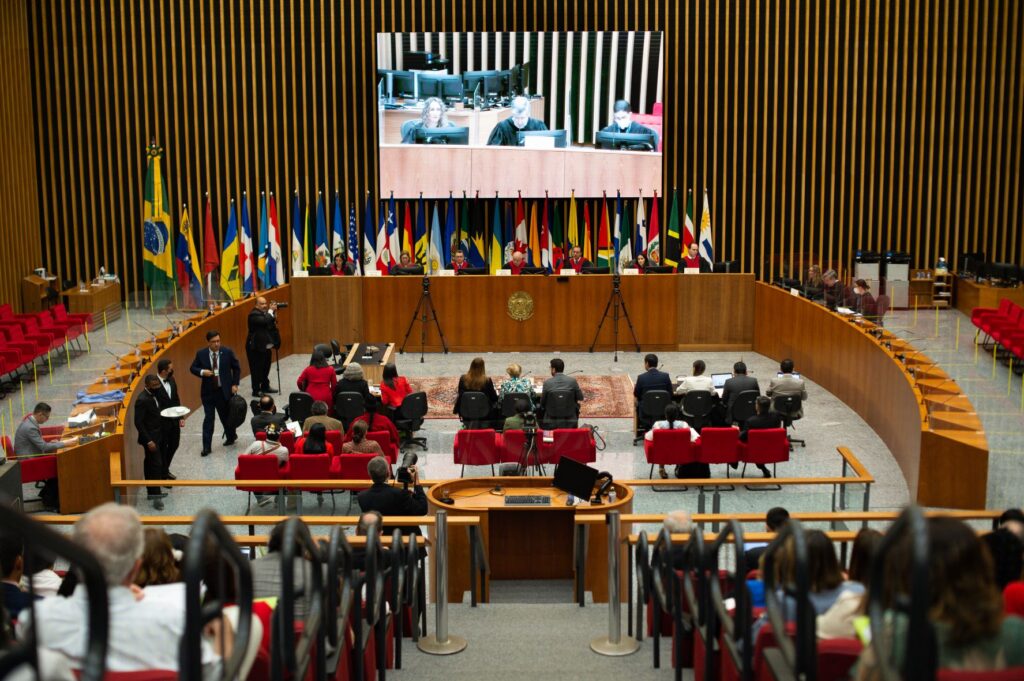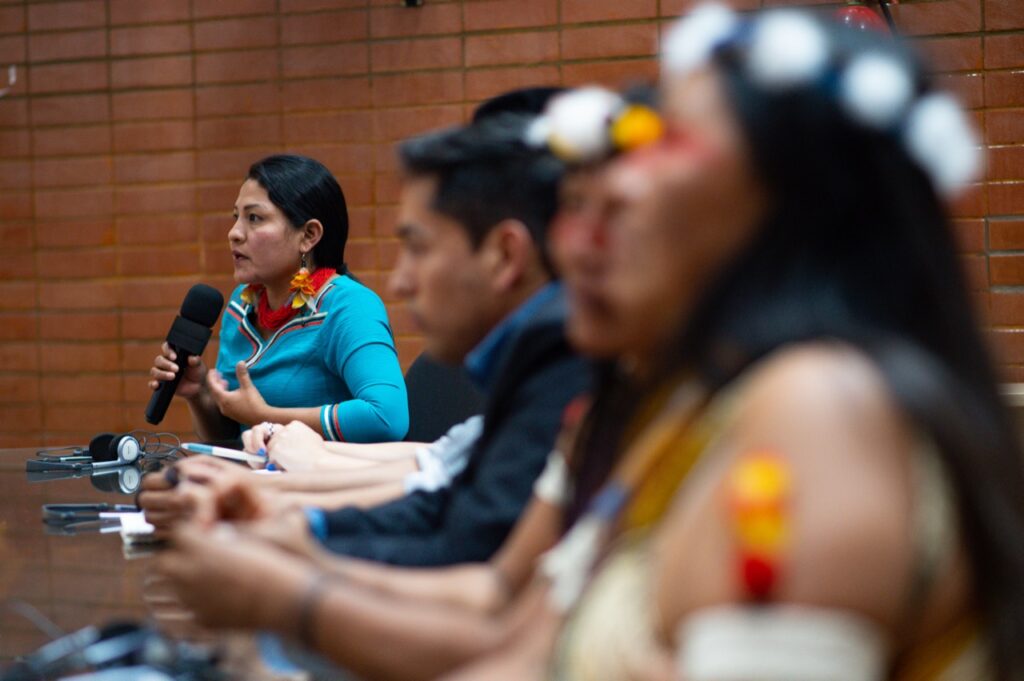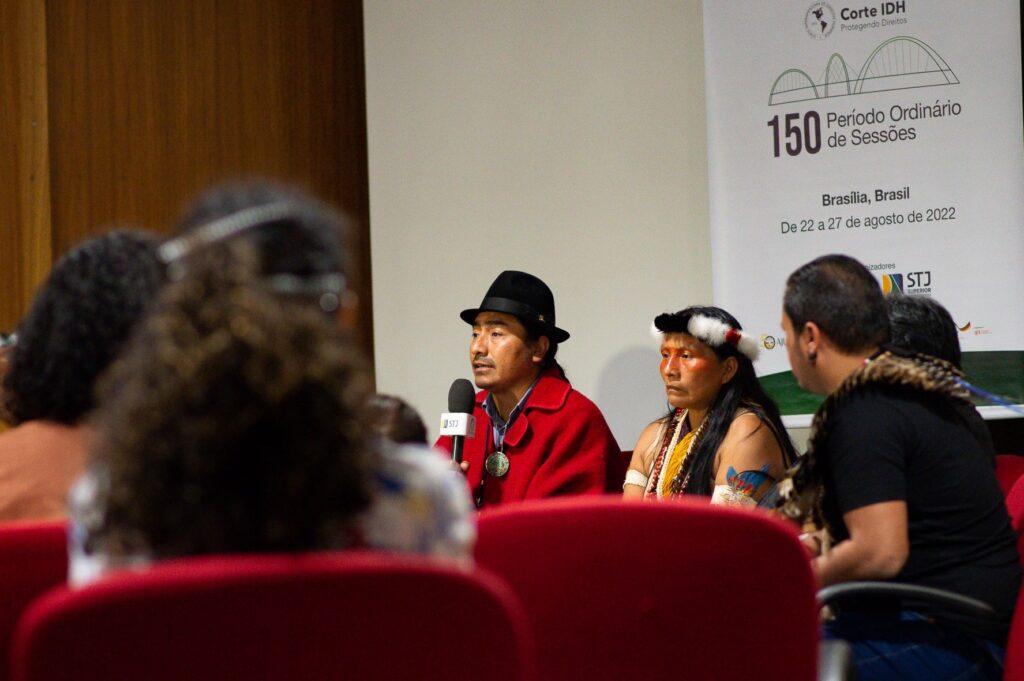
This past Tuesday, August 23rd, the Inter-American Court of Human Rights (IACHR) held a historical public hearing in Brasilia, regarding severe rights violations by the State of Ecuador against the Tagaeri and Taromenane Indigenous Peoples.
Taromenane and Tagaeri are two of the last known Indigenous Peoples Living in Voluntary Isolation and Initial Contact (PIACI) in Ecuador. They inhabit the Yasuní region, in the eastern part of the Ecuadorian Amazon. In this historic case of Tagaeri-Taromenane vs. Ecuador, the Inter-American Court heard the first case regarding the rights of PIACI. The PIACI are holders of human rights in a situation of extreme vulnerability, and among the few who are unable to advocate for their own rights. Indigenous peoples from across Ecuador and Brazil, as well as delegates from several organizations, including Land is Life, took part in the hearing to express solidarity and to defend the rights of the Taromenane and Tagaeri.

Growing pressure over the use of natural resources in Yasuní has been ongoing since the beginning of Ecuador’s oil boom in the 1970s. Yasuní is not only one of the most biodiverse regions on Earth but it also has some of Ecuador’s largest oil reserves. Despite it being designated a national park in 1979, oil companies have been increasingly entering the area and expanding their drilling operations in Indigenous territories. This has led to displacement of Indigenous peoples, forced contact, diminished territories, and contamination of rivers. Even though the State of Ecuador permanently protected part of Yasuní as the “Tagaeri Taromenane Intangible Zone”, an area where extractive industries are supposed to be prohibited, the Zone does not actually follow the boundaries of the territories of these Peoples. The Intangible Zone is too small and has allowed the oil industry to have major impacts on the rights and livelihoods of the Taromenane and Tagaeri, whose ancestral ways of life necessitate the ability to move across and use their entire territory.
The Court Hearing was an attempt to determine whether the State has violated the rights of the Tagaeri and Taromenane by allowing extractive industries to enter their territories. The case also considered the killings of Indigenous peoples in Yasuní that took place in 2003, 2006, and 2013, when conflicts between different tribes escalated due to extractive pressures on their territories. Even though the State was informed about a heightened risk of violence, it did not take any measures to intervene, nor did it fulfill its responsibility to appropriately investigate these devastating cases.
Leonidas Iza, President of the Confederation of Indigenous Nationalities of Ecuador (CONAIE), who testified in support of the victims, stated in his testimony:
“Indigenous peoples take care of their territories for the reproduction of life. We take care of the rights of Mother Nature, not only for the benefit of Indigenous Peoples but of the entire humanity. Indigenous territories are continuously threatened by state policies that favor extractive industries. That has forced us to organize ourselves to resist. – – Oil drilling keeps destroying the Amazon and the ways of life of Indigenous peoples living in isolation. These Peoples, their culture, and their spirituality, are integrally dependent on their territories. They are the guardians of their forests, taking care of and protecting them. If these Peoples die, or are forced to leave, the balance that sustains life in the Yasuní, will break down. Humanity will lose one of the most biodiverse places in the world if we do not act in time. That is why we demand that oil companies are kept out of these territories and that the self-determination of the Taromenane and Tagaeri is guaranteed. The State must respect the life and the rights of these Peoples.”

After working for the defense of the rights of the PIACI for more than 20 years, Land is Life hopes that this case will make a strong precedent for future cases. As the Secretariat of the GTI PIACI Working Group, we demand justice for the Tagaeri and Taromenane and call for their right to self-determination and to remain in voluntary isolation, to be fulfilled. Any extractive operations on Tagaeri and Taromenane territories must be halted.